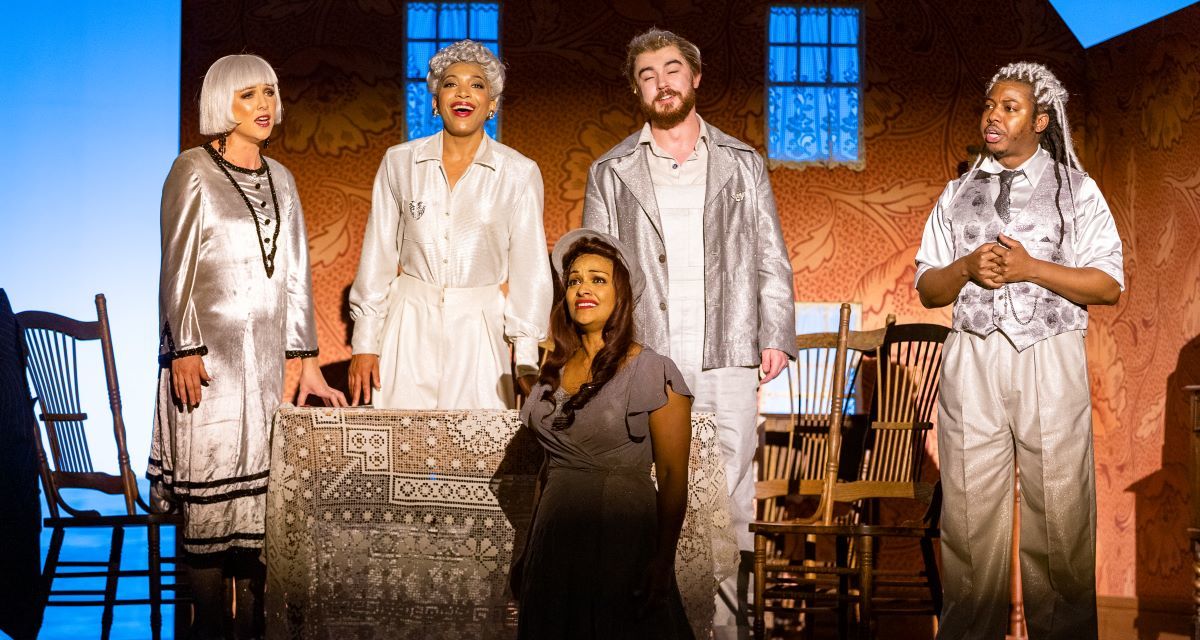This tale of missing money and the kindness found in community must feel especially pertinent at English National Opera (ENO) right now, premiering as it does less than a month after Arts Council England announced that it was removing its funding for the opera company.
This point is underlined when ENO’s artistic director Annilese Miskimmon comes on stage to introduce tonight’s production of It’s a Wonderful Life. She talks about the effect that losing £12.4mn of funding will have, adding that the English opera industry as a whole has lost some 30% of its investment. It’s going to be devastating.
The performance was also prefaced by a poetry reading by ENO’s resident spoken word artist Kieron Rennie celebrating daily kindnesses. I’ve always thought poetry is best experienced live, ideally performed by the poet, and this underlined that belief.
Then it’s on with the show. It’s a Wonderful Life is based on Frank Capra’s 1946 film of the same name. Music is by composer Jake Heggie, with a libretto by Gene Scheer. It received its world premiere at Houston Grand Opera in 2016. This new staging by director Aletta Collins marked its UK premiere.
The story follows that of the film. Set in the small American town of Bedford Falls, we are taken on a whistlestop tour of George Bailey’s life as we find out what went wrong for him to find himself about to jump from a bridge, and what his guardian angel can do to save him – and in the process earn her angel wings.
She shows him that life in Bedford Falls would have been a much poorer place without him. A final disaster involving the loss of $8,000 which could land George in jail and a community that rallies around the much-loved George saves the day. Clara shows George that he does indeed have a wonderful life.
One major change from the source material is that the guardian angel is now female, Clara as opposed to Clarence in the film (played by Henry Travers). In the opera American-Australian soprano Danielle de Niese takes on acting – and singing – duties.
She is a constant presence on stage, always watching what’s going on and occasionally getting involved. Much of the success of the production is dependent on de Niese’s appeal as a performer. Luckily she has this in spades.
Her voice is powerful, clear and concise, without ever dominating. It blends well with the other performers. Her acting is excellent. She is at turns amusing, playful, outraged, and always watchable. Even when she’s not participating in the action it’s impossible not to be aware of her presence.
However, her celebration at gaining her wings and graduating from ‘angel, second class’ to ‘angel, first class’ is somewhat hampered by a wired flying scene that looks awkward and uncomfortable. But this is the opening night and hopefully this will get easier as the run progresses.
American tenor Frederick Ballentine sings the role of George Bailey. He is charismatic and controlled, a foil for de Niese’s much more emotive Clara. His voice is smooth and powerful. British soprano Jennifer France is peppy and enthusiastic as Bailey’s wife Helen.
Special mention must go to American baritone Michael Mayes, who is excellent as the villain of the piece, Mr Potter. His curtain call elicits a round of boos before the audience bursts into applause.
It’s good to see four of ENO’s Harewood Artists on stage. British soprano Keri Fuge, German mezzo-soprano Idunnu Munch, South Africa tenor Zwakele Tshabalala and British bass-baritone Ossian Huskinson form a sort of Greek chorus of angels, first class, guiding Clara in her task.
The sets, by designer Giles Cadle, are impressive. Using ingenious moving parts, a star-filled firmament is transformed into a door-lined attic, to a US high school, to a derelict house to a family home and more. Although the meaning of the traffic lights was somewhat lost and they looked oddly like a Dr Who baddie.
Heggie’s score is sweet and accessible, but it lacks any big standout numbers. This is a consequence of the style: it’s all sung dialogue, with no arias or set pieces. A bit like Hamlet without the soliloquies. It’s well conducted by Nicole Paiement, who handles the baton with a light touch.
Overall It’s a Wonderful Life is witty, fun, but somewhat cheesy and sanitised. It starts with a man on the verge of killing himself but never really explores the darker elements of the story. However, it is Christmas, and this feel-good opera is ideal for families; audiences will surely leave with a smile on their faces.
It’s a Wonderful Life runs 10 December, with 10 performances including a relaxed showing and one that is accompanied by British Sign Language. Tickets cost £10-£150 and are available from the ENO.
Image
Soprano Danielle de Niese as Clara, with her Greek chorus of angels, first class, sung by members of ENO’s Harewood Artists, in the premiere of Jake Heggie’s It’s a Wonderful Life (Lloyd Winters).

